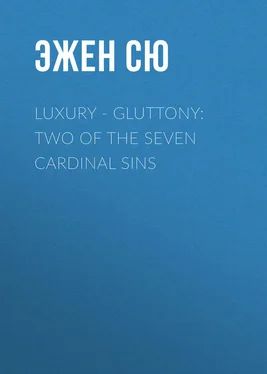Эжен Сю - Luxury - Gluttony - Two of the Seven Cardinal Sins
Здесь есть возможность читать онлайн «Эжен Сю - Luxury - Gluttony - Two of the Seven Cardinal Sins» — ознакомительный отрывок электронной книги совершенно бесплатно, а после прочтения отрывка купить полную версию. В некоторых случаях можно слушать аудио, скачать через торрент в формате fb2 и присутствует краткое содержание. Жанр: literature_19, foreign_antique, foreign_prose, на английском языке. Описание произведения, (предисловие) а так же отзывы посетителей доступны на портале библиотеки ЛибКат.
- Название:Luxury - Gluttony: Two of the Seven Cardinal Sins
- Автор:
- Жанр:
- Год:неизвестен
- ISBN:нет данных
- Рейтинг книги:4 / 5. Голосов: 1
-
Избранное:Добавить в избранное
- Отзывы:
-
Ваша оценка:
- 80
- 1
- 2
- 3
- 4
- 5
Luxury - Gluttony: Two of the Seven Cardinal Sins: краткое содержание, описание и аннотация
Предлагаем к чтению аннотацию, описание, краткое содержание или предисловие (зависит от того, что написал сам автор книги «Luxury - Gluttony: Two of the Seven Cardinal Sins»). Если вы не нашли необходимую информацию о книге — напишите в комментариях, мы постараемся отыскать её.
Luxury - Gluttony: Two of the Seven Cardinal Sins — читать онлайн ознакомительный отрывок
Ниже представлен текст книги, разбитый по страницам. Система сохранения места последней прочитанной страницы, позволяет с удобством читать онлайн бесплатно книгу «Luxury - Gluttony: Two of the Seven Cardinal Sins», без необходимости каждый раз заново искать на чём Вы остановились. Поставьте закладку, и сможете в любой момент перейти на страницу, на которой закончили чтение.
Интервал:
Закладка:
"And what became of her?"
"She was not seen again, she left for Venice," replied Ulrik, showing a second letter, "and there, they write me, another thing has happened."
"What a woman! What a woman!"
"What sort of a woman is she?"
"Have you seen her?"
"No."
"Nor I."
"Nor I."
"They say she is very tall and very slender."
"They told me she was above the ordinary height."
"One thing is sure, she is a brunette, because Moser-Hartmann praises her black eyes and black eyebrows."
"All I can say is," replied Ulrik, "that in this letter from Venice, which place the marquise has recently left for France, as I am informed, she is poetically called the 'blonde star,' so I think she must be a blonde."
"But what has she done in Venice? What has happened there?"
"My faith!" exclaimed Ulrik, "it is an adventure which smacks of the manners of pagan antiquity and the middle ages of Italy at the same time."
Unfortunately for the curiosity of Ulrik's auditors, the sudden beating of a drum outside announced the return of the Archduke Leopold, and each person in the house of the prince at once went to his post, ready to receive the Royal Highness.
In fact, the sentinel of the Élysée, descrying the approach of several carriages in the livery of the King of the French, had called "To arms!" The soldiers on guard with their commanding officer were immediately in line, and at the moment the carriages entered successively the immense court of the Élysée, the drums beat and the troops presented arms.
The first of the carriages stopped before the palace; the footmen in bright red livery opened the door, and his Royal Highness, the Archduke Maximilian Leopold, slowly ascended the steps, conversing with a colonel, officer of ordinance, whose office it was to accompany him; a few steps behind the prince came his aids-de-camp, dressed in brilliant foreign uniforms, and took their places in order at the foot of the steps by the royal carriages. The archduke, thirty-nine years old, was robust, yet slenderly proportioned. He wore with military severity the full-dress uniform of the field-marshal, white coat, with epaulettes of gold; scarlet casimir breeches over which reached the shining black of his high riding-boots, a little dusty, as he had assisted in the review appointed in his honour. The great cordon red, the collar of the fleece of gold, and five or six medallions of different orders ornamented his breast; his hair was pale blond, as was his long moustache turned up in military style, which gave a still more severe expression to his features, and strongly augmented the breadth of his chin and the prominent angle of his nose; his eye, cold and penetrating, half-covered by the eyelid, was set under a very heavy eyebrow, which gave him the air of always looking very high. This severe and disdainful glance, united to an imperious manner and an inflexible carriage of the head, gave to the whole personal bearing of the archduke a remarkable character of arrogant, icy authority.
About a quarter of an hour after the prince had returned to the Élysée, the carriage of a French minister, and that of an ambassador from a great power in the North, stopped successively before the entrance, and the statesman and the diplomatist entered the palace.
Almost at the same moment, one of the principal persons of this story arrived on foot in the court of the Élysée-Bourbon.
M. Pascal, for such was our hero's name, appeared to be about thirty-six years old. He was of middle stature, very dark, and wore quite a long beard, as rough and black as his eyebrows, beneath which glittered two little very piercing gray eyes. As he had the habit of holding his head down, and his two hands in the pockets of his trousers, the attitude served to increase the roundness of his broad shoulders. His features were especially remarkable for their expression of sarcastic sternness, to which was joined that air of inexorable assurance peculiar to people who are convinced of their power and are vain of it. A narrow black cravat, tied, as they say, à la Colin, a long waistcoat of Scotch cloth, a light greatcoat, whitish in colour, a gray hat well worn, and wide nankin trousers, in the pockets of which M. Pascal kept his hands, made up his costume of doubtful cleanliness, and perfectly in harmony with the extreme heat of the season and the habitual carelessness of the wearer.
When M. Pascal passed before the porter's lodge, he was challenged by that functionary, who from the depth of his armchair called:
"Eh! — speak, sir, where are you going?"
Either M. Pascal did not hear the porter, or he did not wish to give himself the trouble to reply, as he continued to walk toward the entrance of the palace without saying a word.
The porter, forced to rise from his armchair, ran after the mute visitor, and said, impatiently:
"I ask again, sir, where are you going? You can reply, can you not?"
M. Pascal stopped, took a disdainful survey of his interlocutor, shrugged his shoulders, and said, as he turned again toward the entrance: "I am going — to see the archduke."
The porter knew the class with which he was accustomed to deal. He could not imagine that this visitor, in a summer greatcoat and loose cravat, really had an audience with the prince, or would dare to present himself before his Highness in a costume so impertinently outside of the regulation, for all persons who had the honour of being received at the palace were usually attired in black; so taking M. Pascal for some half-witted or badly informed tradesman, he followed him, calling in a loud voice:
"But sir, tradespeople who come to see his Highness do not pass by the grand staircase. Down there at the right you will see the door for tradesmen and servants by which you ought to enter."
M. Pascal did not care to talk; he shrugged his shoulders again, and continued his march toward the staircase without a word.
The porter, exasperated by this silence and this obstinacy, seized M. Pascal by the arm, and, speaking louder still, said:
"Must I tell you again, sir, that you cannot pass that way?"
"What do you mean, scoundrel?" cried M. Pascal, in a tone of contempt and anger, as if this outrage on the part of the porter was as insolent as inconceivable, "do you know to whom you are talking?"
There was in these words an expression of authority so threatening, that the poor porter, frightened for a moment, stammered:
"Monsieur, — I — do — not — know."
The great door of the vestibule was suddenly opened. One of the aids-de-camp of the prince, having seen from the parlour window the altercation between the visitor and the porter, hastily descended the staircase, and, eagerly approaching M. Pascal, said to him in excellent French, with a sympathetic tone:
"Ah, monsieur, his Royal Highness will, I am sure, be much grieved by this misunderstanding. Do me the honour to follow me; I will introduce you at once. I have just received orders from monseigneur concerning you, sir."
M. Pascal bowed his head in assent, and followed the aid-de-camp, leaving the porter amazed and afflicted by his own want of address.
When M. Pascal and his guide arrived in the chamber of waiting, where other officials were congregated, the young officer said:
"The audience of his Royal Highness is crowded this morning, because the review detained monseigneur much longer than he expected, so, desiring to make you wait as short a time as possible, he has ordered me to conduct you, upon your arrival, into a chamber adjoining his private office, where his Royal Highness will meet you as soon as his conference with the minister of foreign affairs is ended."
M. Pascal again made sign of assent, and, following the aid-de-camp, crossed a dark passage, and entered a chamber overlooking the magnificent garden of the Élysée-Bourbon.
Читать дальшеИнтервал:
Закладка:
Похожие книги на «Luxury - Gluttony: Two of the Seven Cardinal Sins»
Представляем Вашему вниманию похожие книги на «Luxury - Gluttony: Two of the Seven Cardinal Sins» списком для выбора. Мы отобрали схожую по названию и смыслу литературу в надежде предоставить читателям больше вариантов отыскать новые, интересные, ещё непрочитанные произведения.
Обсуждение, отзывы о книге «Luxury - Gluttony: Two of the Seven Cardinal Sins» и просто собственные мнения читателей. Оставьте ваши комментарии, напишите, что Вы думаете о произведении, его смысле или главных героях. Укажите что конкретно понравилось, а что нет, и почему Вы так считаете.












